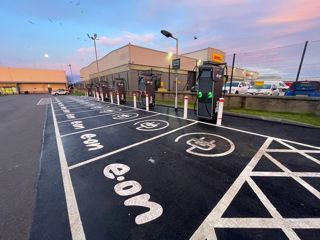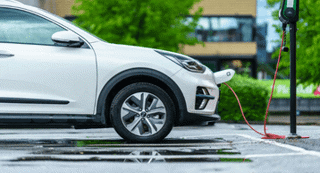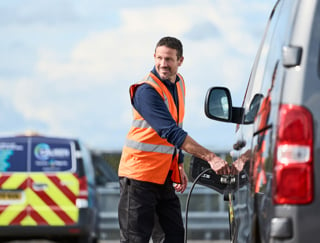Country-by-country analysis shows that the UK is ranked in the top 10 when it comes to facilitating electric vehicle (EV) adoption.
The research, conducted by Ayvens for the latest edition of its Mobility Guide, scores a total of 47 countries based on three levels of EV maturity: ‘developed’, ‘transitioning’ and ‘emerging’.
To determine these levels, six core factors were assessed to provide an overall country maturity score on a scale from 0 to 100.
Core factors assessed included, charging infrastructure, taxation and regulation, green powertrain offering, sustainability relevance of electricity and battery electric vehicle (BEV) total cost of ownership (TCO) parity versus internal combustion engine (ICE) model equivalent comparison.
The UK scored 63 – the same as Germany and a three-point increase on its 2023 score – putting it in joint ninth place and giving it a ‘developed’ outlook for its EV market.
Its overall score was let down by low scores for the sustainability of electricity and the BEV TCO comparison.
The most advanced countries in terms of facilitating EV adoption are Norway (82/100), the Netherlands (80/100) and Finland (74/100).
In all, 13 European countries fall into the ‘developed’ category versus 11 in 2023.
BEV TCO remains more competitive in 13 European countries: Belgium, Denmark, Finland, Germany, Greece, Ireland, Italy, Luxembourg, the Netherlands, Norway, Poland, Portugal and Switzerland (vs 15 countries in 2023), but overall it has deteriorated compared to ICE vehicles in some markets.
In France, Sweden and Spain, TCO is now higher than ICE, notably due to the end of governmental subsidies or increase in energy costs.
For the UK and Austria, BEV TCO is now back at simple parity.
Although the EV market is maturing, EV adoption continues to face multiple challenges, such as price volatility, evolving TCO, geopolitical trade tensions, fragmented and changing regulation, changes in subsidies, new taxation rules, and general market conditions, which continue to shape the EV ecosystem, says the report.
Annie Pin, chief commercial officer at Ayvens, explained: “The transition to electrification should and will happen, but it will take time and it will not be a linear journey.
“Our Mobility Guide aims to provide a nuanced and holistic approach to address the diverse set of issues that affect our customers’ transition to sustainable mobility.
“BEV is one of the solutions available today that is chosen by our customers to decarbonise their mobility and, in combination with additional alternatives, is helping them to progressively meet their climate commitments and ultimately reduce their C02 emissions.
“In the turbulent and volatile electric market, as a leading global mobility player, Ayvens has an important role to play in demystifying the electrification landscape for our clients, particularly for fleet managers with international fleets.
“Our goal is to empower them with the insights and the solutions they need to make a successful transition to more sustainable mobility.”
The report draws upon data from Ayvens’ fleet of 3.4 million vehicles, as well as its local presence in 42 countries and 5 additional countries through local alliances.

























martinwinlow - 12/07/2024 13:17
That doesn't say much for the rest of the planet, sadly...